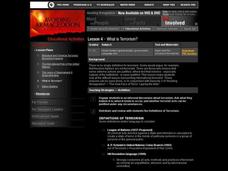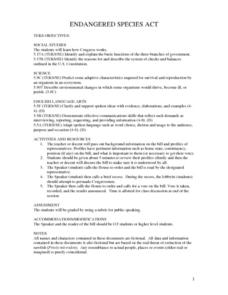Judicial Learning Center
Article III and the Courts
What's the best way to make sense of the Constitution? A helpful lesson contains both the text of Article III and annotation of each of its sections, breaking it down into easy-to-understand parts. It also includes links to a glossary...
Judicial Learning Center
The Players in the Courtroom
Courtrooms are complicated. In addition to the many rules, there are a number of people whose jobs are not very clear to the casual courtroom observer. With the resource, individuals identify some of these roles and review more...
National Endowment for the Humanities
Ratifying the Constitution
Ratifying the Constitution was no simple task. Using primary sources, such as classic writings from the Federalists and Anti-Federalists, young scholars examine the arguments for and against the Constitution. They then decide: Would they...
Curated OER
Avoiding Armageddon
PBS has written a series of lessons on avoiding Armageddon. This is lesson 4 of 5 and focuses on defining terrorism. Upper graders watch episode 3 of "Avoiding Armageddon - The New Face of Terror," read how terrorism is defined by the...
Heritage Foundation
Courts and Judges
If the Supreme Court is so supreme, why do all cases not just start there? High schoolers learn why every case does not start at the Supreme Court as well as the importance of hierarchy in the US judicial system in the 11th installment...
PBS
President Theodore Roosevelt: Foreign Policy Statesman or Bully?
Can a negative perception of a president's foreign policy harm his or her historical legacy? A project that winds the clock back to the date of Theodore Roosevelt's death puts students at the editorial desk of a fictional newspaper....
Heritage Foundation
Lawmaking and the Rule of the Law
How many constitutional clauses does it take to create a bill? High schoolers find out with several activities and selected clauses about the rule of law and the US Constitution. Various coinciding activities help to strengthen learning.
Curated OER
Endangered Species Act
Students spend the duration of this instructional activity examining the text of the Endangered Species Act. Individually, they complete a profile to determine where they stand on the bill and read excerpts from it. Some role-play the...
Curated OER
Senate Judiciary Committee Confirmation Simulation
Students research the Supreme Court judicial selection process while role playing. They examine the political nature of the process and discuss merits of Supreme Court nominees.
Curated OER
Just how broken is the Senate?
Twelfth graders examine the role of the Senate in the United States. In this American Government lesson plan, 12th graders read various articles and answer questions to these articles. Students write a letter to their Senator on a...
Curated OER
It's All About Justice
Students examine a specific environmental concern to their local community. In groups, they explore how the justice system would deal with the problem by participating in a treasure hunt. They review the meaning of federal and state...
Curated OER
Graphically Speaking
Students discover the links between population and Congressional representation. In this government lesson, students research population statistics and create spreadsheets that compare population to the number of Congress members per state.
Curated OER
Portraits Of Power: American Presidents
Students discover the responsibilities of the presidency. In this U.S. government lesson, students watch "Portraits Of Power: American Presidents," and then compose essays regarding the citizens' relationship to the presidency.
Curated OER
Capitals of Ohio
Fourth graders construct timelines of historic Ohio events and explain how it progressed from territory to state. They locate points of interest on a state map.
Curated OER
Federalism and the Prevention of Abuse of Power in the US Federal Government
Fourth graders stud Federalism and identify examples of abuse of power.
Curated OER
A Quest for Freedom
Students study the atrocities of slavery. They examine the issues raised by the legacy of slavery in Brazil by reading and discussing "Brazil's Former Slave Havens Slowly Pressing for Rights." They create a slave identity based on...
Judicial Learning Center
The Power of Judicial Review
Marbury v. Madison is arguably the most important landmark case in the history of the Supreme Court. A fact-filled lesson provides background information about the case and two others related to the concept of judicial review. Scholars...
Jeopardy Labs
Third Grade Social Studies Review
In this interactive JeopardyLab game, with the assistance of a teacher, students can play against each other or in teams to review the content of Third Grade Social Studies. Allow the first team to choose a topic and a point value for a...
Judicial Learning Center
Types of Court Cases
How can one court acquit someone of a crime, while another convicts the person of the same one? It's all because of the differences between civil and criminal trials. An informative resource provides scholars in the field of criminology...
Judicial Learning Center
Judicial Independence
Most people support the idea of an independent judiciary in theory until they hear about a court case that violates their principles. An informative resource explains why the concept is important. It also provides scholars of criminology...
Judicial Learning Center
Levels of the Federal Courts
The Supreme Court gets all the glory, but very few federal cases make it to the highest court. An interesting lesson explores the structure of the lower levels of the federal court system. In addition to outlining the organization of...
Bill of Rights Institute
Celebrate Constitution Day
September 17 is a great day to focus on the US Constitution for on this day in 1787, the Constitution was signed. Through a series of activities, high schoolers get a chance to look closely at this famous document and the rights and...
Constitution Facts
U.S. Constitution Crossword Puzzles: Basic #1
Reinforce U.S. Constitution facts with a crossword puzzle. Scholars show what they know by completing the 53 prompts.
National Endowment for the Humanities
George Washington: The Precedent President
Everyone knows that George Washington was the first president, but do your scholars know why that was so important? The lesson plan, the third in a sequence of three, allows learners to understand how George Washington set a precedent...

























